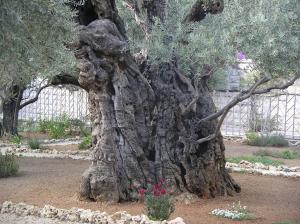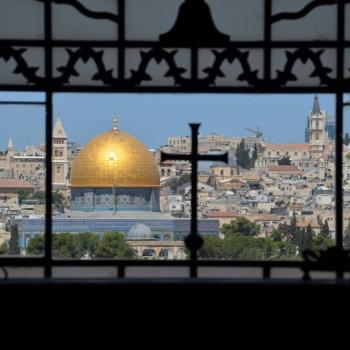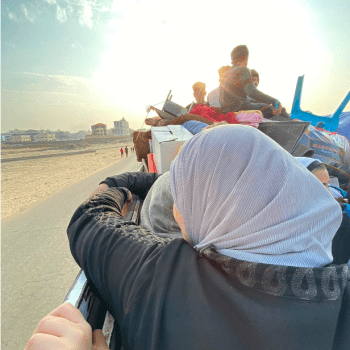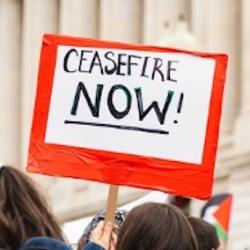A Holy Week conversation: Christians and Muslims have a lot more in common than most of us think, and we’ll be looking at examples all week. Today’s topic: the struggle to love. (Join my mailing list to receive the whole series, hot off the presses.)
As a Christian married to a Muslim, my reading list includes some lesser-known, but fascinating titles. Today I’d like to share some insights from one of them.
I recently finished reading a fascinating book called City of Wrong: A Friday in Jerusalem. It was originally written in Arabic in the 1950s by M. Kamel Hussein (a Muslim), and was translated by Kenneth Cragg (a Christian). Here’s part of the short description from the back cover: “City of Wrong was the first book written in the Islamic world to make a thorough study of Christianity’s central theme—Christ’s crucifixion—and to show its profound significance for a devout Muslim.”

I’ve always assumed that the Christian and Muslim versions of that Good Friday were utterly incompatible. Christians believe that Jesus died; Muslims believe he was taken up to heaven before the crucifixion and someone (possibly Judas) was made to look like him, took Jesus’ place on the cross, and died.
Don’t snicker, Christians! There is logic behind this: an actual bad guy gets punished (that’s justice), and Jesus—who did no wrong—escapes (that’s mercy). Muslims give Jesus special honor because they believe he went to heaven without dying.
As the author of City of Wrong suggests, it is possible to set aside the question of the actual crucifixion for a while and consider some profound, shared Holy Week truths. One truth he offers is this:
Both Muslims and Christians believe that the religious leaders wanted Jesus dead, and took measures to make it happen.
Hussein describes the Pharisees’ dilemma: “The whole perplexity in the matter goes back to the fact that [Jesus’] presence is a menace. And since he is innocent, what way is there to be rid of him other than injustice?”
The very same Pharisees who tithed dill and mint and cumin (Matt. 23:23), who “would not enter the judgment hall lest they should be defiled” (John 18:28), for all their meticulous attention to the details of the law, got it completely wrong. They knew Jesus was innocent, but were perfectly at ease about murdering him.
The translator says in his introduction,
“This strange mingling of legal scruple and utter moral blindness is a terrifying measure of the failure of all law and ideology…Empires proud of law and discipline commit the most fearful crimes.”
We don’t have to look far to see the truth of this statement. On a national level, the “holiest” countries have done great wrongs: Saudi Arabia—my home away from home for ten years – self-nicknamed “Custodian of the Two Holy Mosques” – routinely commits egregious crimes against its own people and the people of Yemen. The Taliban set out to corral Afghanistan into a flawless practice of strict Islam, but mixed it with a misogynistic, punitive culture that horrified the world. The United States saw itself from the beginning as “a city on a hill,” but supported slavery, genocide of native peoples, and the marginalization of minorities. And (my regular readers won’t be surprised by this example) Jewish people of Israel consider themselves God’s chosen, but commit atrocities against the Palestinians.
It’s easy to look east to the Muslim world and accuse it of “fearful crimes” in the name of religion. And indeed, in some areas it’s true. I mentioned Saudi Arabia and Afghanistan, and there are other Islamic countries and movements participating in human rights abuses – but a huge part of the Muslim world lives in relative calm and freedom, women included. We in the West could stand to adjust our paradigm so that it’s based on reality, not stereotypes.

But what about us? Ponder this question this Holy Week: are we, American Christians, also participating in this “strange mingling of legal scruple and utter moral blindness” too? We don’t have a Christian ISIS, but are we mixed up in anything unfitting to the people of God?
There’s only one way to find out, and that is through reflection (leadership, corporate, and individual). Unfortunately, American Christians are not good at reflecting. We are good at assuming we’re already 100% tracking with God, and therefore not in need of such contemplation.
This is also true of the faithful in other religions – as well as people who don’t believe in a religion, but trust in any worldly ideology (including political parties).
All of us, from all faiths and ideologies, need to spend time critically thinking about the ideals of our belief system: am I putting my faith in something that will bless all people, or only my people or myself?
The Christian faith is based (at least in theory) on loving God and loving others as we love ourselves – all others. So it passes the first test.
Next, do we live out those ideals? Does your denomination or group give you permission to love some and hate others?
I contemplated some of the assumptions of my religious upbringing and found them wanting. It was hard to walk away from the system – but it would have been impossible to stay.
Islam is ultimately about love too. (Don’t believe me? Stay tuned – we will be busting lots of myths about Islam in the coming weeks!) My husband has done his own soul-searching (read about part of it here), and he found that Islam was indeed designed to bring blessing to all people. He also realized that the type of Islam he’d learned – Saudi Wahhibism – does not match the ideals of true Islam. So he left it for a more progressive Islam.
I encourage you to detach from your political party for a moment if you can (if you can’t, that’s a whole ‘nother conversation), and ask yourself:
Does my faith community encourage me, in all that I do, to show love for God and all others?
If you realize that you’re in a place that’s more about discipline than unfettered love, you have an opportunity right now to make a change. Is it a denominational issue? Change denominations (Beth Moore did). Is it a personal issue? Prayerfully begin a paradigm shift – and know that you’re not alone! There must be millions of us “ex-vangelicals” out here.
Holy Week is a beautiful time to begin. I hope you will join me in pondering the breadth of your love.
YOU MIGHT ENJOY READING THESE PREVIOUS POSTS:
- Interfaith harmony: the kinship of Christians and Muslims
- Beth Moore: the cost of leaving home
- What if I don’t actually “need” my stimulus check?
- The folly of having “right” theology
FEATURED IMAGE: Garden of Gethsemane, from a trip I took to Palestine and Israel about 2012.













